New laws, parole changes for inmates caught with drugs
A major legislative overhaul for SA’s prisons will see more jail for prisoners caught with drugs, the abolition of automatic parole for traffickers and drone no-fly zones.
SA News
Don't miss out on the headlines from SA News. Followed categories will be added to My News.
Any inmate caught with drugs or other prohibited items will face criminal sanctions that carry a prison term of up to five years under a proposed law.
And another new offence would mean that three or more prisoners gathering for any prohibited activity that disrupts a prison would face up to 10 years in jail. The laws are among a swath of new measures and increased penalties for some existing offences that are in a major revamp of the Correctional Services Act.
A key measure will see automatic parole abolished for convicted drug traffickers serving five years or less. Like sex offenders, those convicted of violence offences, terrorism and arson offences, drug traffickers will have to appear before the Parole Board to secure their release and have strict parole conditions set.
In another major initiative, prisoners on remand will be given access to key rehabilitation and some work programs for the first time, in a move to cut recidivism.
It is likely to be welcomed by remand inmates, who complain about the boredom and lack of mental stimulus at the Adelaide Remand Centre.
It is likely many inmates awaiting trial for violent offending — though not yet convicted — will take advantage of the move to help in their sentencing process should they either plead guilty or be convicted.

Correctional Services Minister Corey Wingard said yesterday the major aim of the revamp was “ensuring community safety”.
“One is to ensure we are tough on crime and keep the community safe but we also have an eye to reduce reoffending so when people are released, they have the best chance to rejoin society and give back,’’ he said.
While many of the measures were in a lapsed amendment Bill introduced in late 2017 by the then-Labor government that was supported by the Liberal Opposition, there are a significant number of new initiatives that will affect both prisoners and the public.
Some of the key measures include:
A BAN on the use of drones within 100m of a prison
THE creation of “buffer zone’’ around a prison in which possession of certain items is a criminal offence
INCREASED prison terms for those convicted of bringing drugs into prisons
MEASURES limiting contact between prisoners and their victims via mail
PROVISIONS allowing the chief executive to compel prison officers to participate in post-incident reviews and investigations
GIVING the police commissioner the power to object to the employment of any individual within Correctional Services.
Mr Wingard said the new drug laws were aimed at creating a “prison zone’’ similar to the zones created around schools that attract higher penalties for drug possession.
So far this financial year, there have been 39 incidents of drug finds across the state’s prisons. Mr Wingard said the new laws in this area would act as a deterrent to both prisoners using drugs and those who sought to supply the drugs to them.
“We made it clear even before the election that is something we will not tolerate,’’ he said.

“People want us to be tough in these areas and this is one we will be very strong on.’’
At present, an inmate caught with drugs or contraband — such as a mobile telephone — only faces internal sanctions.
Mr Wingard said allowing remand prisoners to access rehabilitation programs should prove beneficial in reducing recidivism.
Many remand prisoners are released when they are convicted and sentenced because they have already served their sentence on remand, which meant they had no opportunity to access such programs to help them. “About a third of our prisoners are on remand and have not been doing any rehabilitation or work programs and are released back into the community,’’ he said.
“Some of the programs run through prisons are fantastic to get people working, if we can get them out of that system and into work, they are more likely not to reoffend.
“When people engage with these programs, they do get a lot out of them.’’
Another measure would mean that decisions made by the Parole Board concerning breaches of parole by “lifers’’ would be subject to review by the state’s Parole Administrative Review Commissioner David Bleby, QC.
At present, if a lifer breaches their parole, the Parole Board has the sole discretion concerning their freedom.
The new measures are being provided to stakeholders for comment before the final amendment Bill goes before the Cabinet for approval.


